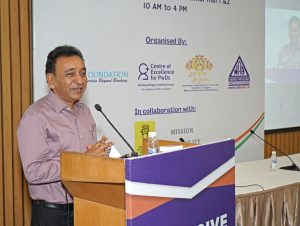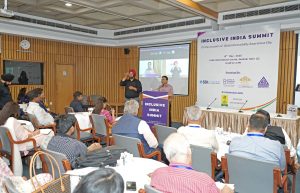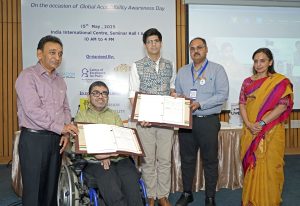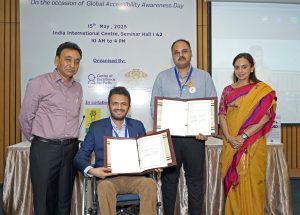DEPwD organizes ‘Inclusive India Summit’ on Global Accessibility Awareness Day, in New Delhi today

Keynote Address
The Chief Guest, Shri Rajesh Aggarwal, Secretary (DEPwD), emphasized that accessibility and inclusion are collective responsibilities. He highlighted three key life aspects—Life, Learning, and Livelihood—stating that every Divyangjan has the right to live with dignity. He also stressed the transformative power of technology and the need to make it more accessible.
Regarding education, he advocated for inclusive infrastructure to allow Divyang children to access mainstream education. He acknowledged the role of special schools but underscored the growing importance of inclusive education models.
On livelihood, he highlighted the success stories of Divyang youth and encouraged parents to believe in their children’s capabilities. He also acknowledged the corporate sector’s role in creating employment opportunities for persons with disabilities.

MoUs Signed During the Summit
- I for Humanity Foundation: Focuses on developing accessible infrastructure and transportation. Includes creation of checklists, toolkits, and an Accessibility Index for auditing public buildings.
- Nipman Foundation and Young Leaders for Active Citizenship (YLAC): Aims to promote innovation and awareness of disability rights through hackathons, competitions, and Equal Opportunity Awards.

- Ramp My City Foundation: Targets the development of barrier-free infrastructure in public places including healthcare centres, tourist sites, and government buildings.

Technology for Accessibility
The summit showcased a voice and WhatsApp-based AI-enabled chatbot developed with Sarvam AI. This tool aims to enhance access to disability-related information and government schemes.
Remarks by Dignitaries
Ms. Manmeet Kaur Nanda, Additional Secretary (DEPwD), highlighted that accessibility is a shared effort and is foundational to true inclusivity and development for persons with disabilities.
Shri Sanjay Prakash, Managing Director of SBI Foundation, stated that accessibility is more than physical infrastructure—it is a tool for meaningful transformation in the lives of persons with disabilities.
Conclusion
The summit marked a major step towards building an inclusive India. With active participation from government officials, NGOs, and private sector representatives, it laid the groundwork for a future where accessibility and inclusivity are not aspirations but realities.


